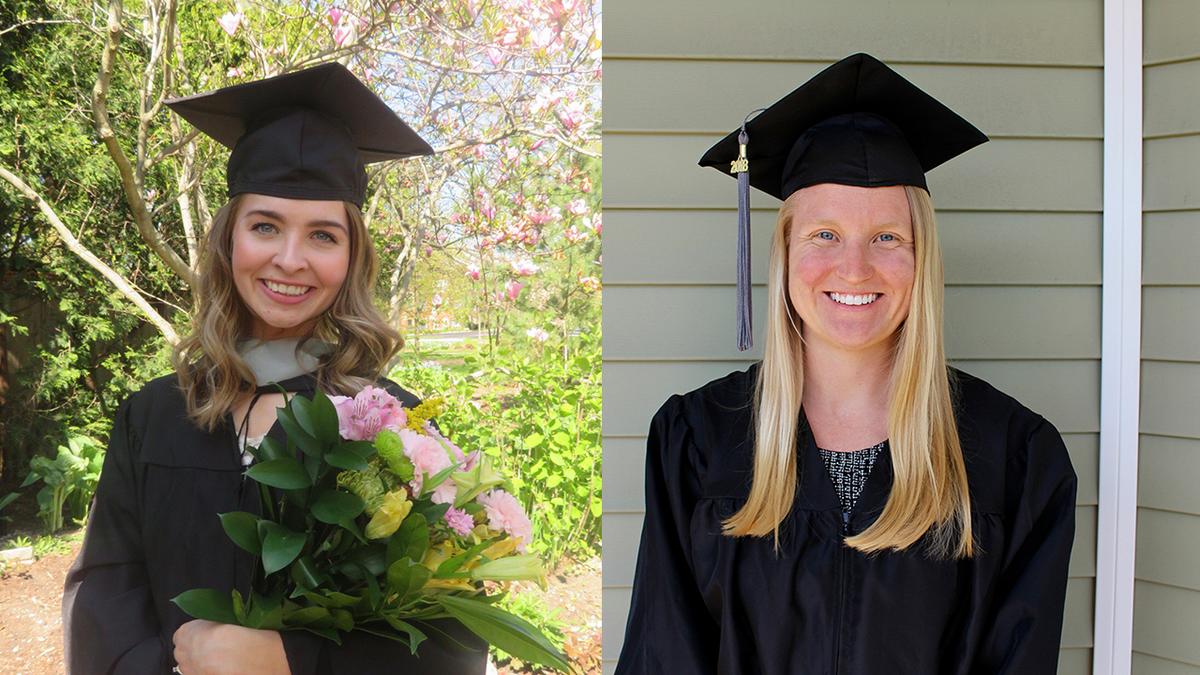Internships form the capstone of many academic programs, providing real-life experiences to help students succeed in their fields after graduation. But for some career paths, like speech-language pathology, experiential learning isn’t just helpful, it’s required.
In addition to academic coursework, graduate students training to be speech-language pathologists (SLPs) in UMD’s Department of Communication Sciences and Disorders (CSD) must complete 400 hours of supervised internships to become certified for eventual employment. The coronavirus pandemic created a dilemma for students during spring semester, as their internships at hospitals and schools were quashed.
“This left a lot of students halfway through the semester without the clinical hours they needed for certification,” explains Ashley Weber, clinical instructor.
Faculty in CSD took quick action on behalf of their students, reaching out to organizations that provided services via telehealth and used connections with alumni of the program to help secure supplementary internship placements. It proved to be a creative solution that allowed students to continue providing direct client care.
Thanks to this effort, seven students who had been left in the lurch when their internships were canceled were able to attain the hours needed for certification in time for graduation. Students worked with several different entities to deliver virtual speech therapy through interactive online platforms to kids ranging from age 3 to 18.
A Collaborative Effort
Some of the contracts Weber helped set up for students were with organizations that were in the process of adapting their services to enable teletherapy for the first time. She praises the preceptors for taking on students in the midst of this crisis.
“Their willingness to still support students in this chaotic time was unbelievable,” Weber says, noting that students are now in a better position to obtain employment and serve clients because they have teletherapy experience. “It was an experience they would not have received otherwise, so there’s a silver lining here.”
Kelsey Ernste, speech-language pathologist for the Minnesota State Academies for the Deaf and Blind, was one of the preceptors. As a proud alumna of the UMD program, she was happy to help supervise the students. “Ashley helped streamline the process and made it easy to onboard the students. The support from UMD is what made it successful from the beginning,” she says.
Ernste admits that she was learning right along with students during the organization’s transition to delivering teletherapy but she points out that educators are used to problem-solving on the fly and improvising. “That made the transition less daunting,” she says. “We were able to deliver quality services from the get-go.”
Setting up good communication guidelines with students was key to success, according to Ernste. She employed tools like texting, Google chat, and Zoom to make sure students got regular feedback and opportunities to ask questions.
“The students themselves were great. They were ready to roll up their sleeves and dive in and learn whatever they could,” she says. “They had a beneficial attitude and willingness to participate, learn, and make mistakes.”
Advancing Student Learning
Teletherapy opened up valuable opportunities for student internships outside of Duluth. When Sommer Heikkila’s internship at St. Luke’s was called off in the beginning of March, she was nervous. “I’ve been working at this for 6 years. To come up 50 clinical hours short would be devastating,” she says.
Heikkila is grateful to her UMD instructors for quickly finding her a telepractice alternative. She was placed with the Bold School District in Olivia, MN with a supervisor that didn’t know much about teletherapy but they worked through that together. “My preceptor was awesome. We both learned how to do it together,” says Heikkila. “In the first week, I had to learn 40 new kids. I jumped right in and basically started treating them right away.”
Like Heikkila, Erika Klang's internship at a local hospital ended early due to the coronavirus. “It was sad and also very stressful and overwhelming because I needed 30 more hours for certification,” she says.
Klang was placed at the Minnesota State Academies for the Deaf and Blind under Ernste’s supervision. She hadn’t previously worked in a school setting or with children who were deaf or hard of hearing. Even though Klang isn’t fluent in ASL, she was able to provide services with interpreting assistance. “That was another challenge and opportunity to grow in my internship,” she says.
Both students learned that it can be tricky to build relationships and hold a younger child’s attention during a therapy session when you’re not in-person. They adapted by incorporating advice from their supervisors and peers. They also enlisted creativity and online resources. From changing Zoom backgrounds to be more engaging to playing interactive games, they found ways to succeed.
They emerged from the experience with more confidence in their abilities. Though Heikkila still prefers in-person therapy sessions, she enjoyed learning about teletherapy firsthand and sees that it can be a valuable tool. “In our coursework, we just talked about telework. It’s great to know that I can do it,” she says.
Heikkila is thankful to have been offered a job before the pandemic began. She’ll be starting at Mercy Hospital in Moose Lake in July, working with a range of clients both at the hospital and in their homes.
Klang will be on the job market after graduation and she feels well-prepared after this internship. “It’s nice to have had that experience that I can put on my resume,” she says, noting that the SLP job openings she has seen lately have indicated a preference for teletherapy experience.
“I’m grateful for having had the opportunity to have the experience and gain the knowledge from it. I’m not sure what’s going to happen in the future but it’s an experience I’ll be able to use in my future career.”
Pictured at top: Erika Klang and Sommer Heikkila
